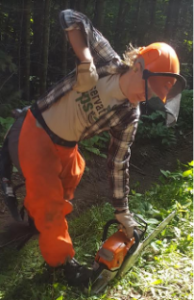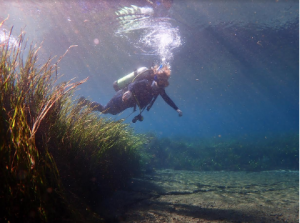The Long Way Around: the struggles of reentering ecology research
by Hayley Henderson
By the time I was about to graduate high school, I was too busy trying to live until tomorrow to think of a future for myself. Many of my classmates had careers already in mind – intelligence security, computer engineering, veterinarian science. They’d talk about them openly, about summer internships, the best schools to apply to, the best way to load out their courses for success. When it would come to my turn, I would just shrug.
“I’m 16,” I’d say, even when the application deadline was looming just a few weeks ahead. “How am I supposed to know what I want to do for the rest of my life, let alone how to get there?”
I wouldn’t mention that I was barely surviving.
Eventually, that deadline grew from weeks to hours away. I chose almost randomly: five schools from the few I’d toured and those that had hinted at academic scholarships for AP-level good grades. I even applied to a few universities abroad, although I knew even when the acceptance letters rolled in that I would never have the money to actually attend them without spiraling into crushing debt. In the end, I chose the most logical, least sentimental choice: a small university in Maryland that had offered me an academic scholarship that increased each year. When asked for my major of choice, I chose biology not because I liked it or even enjoyed it, but because it was a “logical” choice given the number of career paths in the field.
My freshman year in college, my struggles lessened. I had loaded myself up with ecology courses and, to my shock, school no longer felt like another burden to bear. Instead, it was helping me get better. It was like I’d been living for years in an empty apartment, sleeping on the bare floor hoping something would change but unable to do anything about it, only to suddenly come home and find it filled it with comfortable furniture. Suddenly my life was more than about just surviving until tomorrow. It was about living with joy, friends, passion – passion for my life, for my hobbies, for my ecology studies. For my future.
By my sophomore year, I knew I wanted to get my Ph.D. in ecology. Every time I had to do research for a paper, I would spend hours just reading publications. I thrived in learning how the tangled web of ecological interconnection worked, how even a small change could affect the entire system. I wanted to eat up every bit of information I could.
Then many of my friends a few years older than me graduated. Some went directly into graduate school. Many of them quit within the first semester. I swore I would learn from their example: instead of applying to graduate school right away, I would work in the field, get more research experience there, and let my experiences shape my graduate applications.

Hayley hard at work in the field in 2017.
Little did I know how hard it is to get into research without a graduate degree, let alone how brutal applying for field work is without one, and I soon realized I was stuck in a horrible cycle: to get into graduate school, I needed more research experience. To get a field work position for more than six months which might allow me to do research, I needed a graduate degree. Worse yet, because Master’s degrees were becoming increasingly more common, people with Master’s degrees were struggling as much as I was to find work, and so started applying to field work positions. Each fall when graduate school application season rolled around, I would be caught between applying for graduate school and trying to apply for jobs as my 6-month contract was coming to an end just to keep myself afloat in a world I couldn’t financially afford.
Then my field experience worked to my advantage as I applied to be the laboratory manager for a Landscape Ecology lab. While other applicants may have had Master’s degrees, their only field experience was from their own project. But me? I knew how to handle the logistics of field work issues. Sure, it took me five years to get into another research position and I’m still not in graduate school, but I feel like I’m back on track. Here, I’m gaining just as much if not more experience than a Master’s student: I can create and design projects, implement them, publish on them. Not just my own projects either, but all of the projects the lab produces. I will have more experience than I ever thought I could – it’s like a dream come true!

Hayley simultaneously scuba diving in Florida and daydreaming about earning a Ph.D. in marine botany.
So, if you too find yourself stuck in the cycle of field work vs. graduate school, take a deep breath. The field work helped align your interests with your future. You are the one who know how to make sure experimental designs survive field troubles. They may be hard to find, but there are positions out there that can help get you back into research or even directly into graduate school. It doesn’t matter how late you bloom, if you’re five years or twenty years out from your Bachelor’s degree – there is room for us in research. It’s hard, maybe harder than applying immediately for graduate school after your Bachelor’s, maybe harder than it ought to be, but there is room for us here.
But isn’t just room for us in research. It’s on our backs that research is created. With our field knowledge, we make research better.
So, keep trying. Keep digging. Keep getting your hands dirty while you push through the application process. Reach out to those around you, to online networks, or even to me when you need help – there’s no shame in struggling, in needing help, or in wanting more for yourself. Most importantly, remember:
We can do this.
Hayley Henderson is the Lab Manager of the Landscape Ecology & Sustainability Science Laboratory at the University of Florida’s Institute of Food and Agricultural Sciences. She previously received her Bachelor’s of Science in biology from Stevenson University, after which she worked many years as a field botanist with the U.S. Department of Agriculture’s Forest Service. Her interests lie most in understanding and mitigating how climate change and other anthropogenic forces cause trophic cascades, particularly in marine animal-habitat interactions. She plans to apply for a Ph.D. in the topic within the next few years.
Want to try your own hand at writing a blog post for the Early Career Ecology section? We’re always accepting contributions from section members! For more information, email Cait Rottler at caitlin.m.rottler@nullgmail.com.